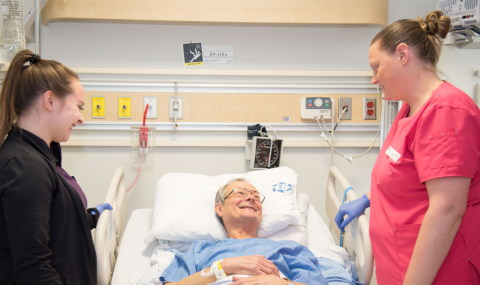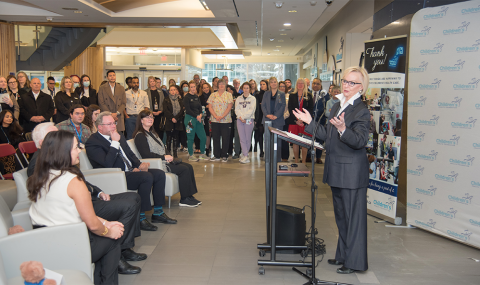MEDIA RELEASE
For Immediate Release:
June 28 , 2018
How fatigued driving almost ended the music
LONDON, Ontario – Mel Martin thought he was doing everything right. That August day in 2017, the Stratford Festival Orchestra violinist had napped in the afternoon knowing he had an evening performance and would be headed home late. He set his car on cruise control at 90km/hour so that he wouldn’t inadvertently drive too fast down the country roads winding his way back to London. He hadn’t touched a drop of alcohol. And he was excited about an upcoming four day mini-vacation he had booked because he knew he was in need of a break. But in an instant, those vacation plans came to a screeching halt when Martin fell asleep behind the wheel, his car gliding into a ditch and ultimately crashing into a crossroad culvert.
“I don’t remember the impact at all,” says Martin. “I remember waking up and trying to open the driver’s side door, but it wouldn’t budge. The front of my car was on fire. I must have tried crawling out the other side but passed out, because when I woke up again, passersby were tending to me as I hung out the passenger’s side window, and a homeowner who lived next to the crash site was putting the fire out with an extinguisher.”
Safe driving campaigns in recent years have paid special attention to the issues of impaired driving and driving while distracted, but it’s estimated that 20 per cent of fatal collisions are due to driver fatigue.
“Driving while distracted and driving while under the influence of alcohol or drugs are extremely dangerous and continue to be a concern,” says Jane Edwards, LHSC Injury Prevention Specialist. “Driving while fatigued, however, is another important factor people need to be mindful of, particularly at this time of year when families will be headed to cottage country or on extended vacation road trips.”
Fatigue can hit quickly and without warning. “I was almost home and suddenly, there I was in the ditch,” says Martin. “My memories of that evening are hazy, but I remember waking up in hospital the next day following several surgeries not understanding how things could be as bad as they were.”
“It’s easy to think that a quick catnap in the afternoon will give you the energy to drive through the night, or that heading home late after a party isn’t dangerous because you’re driving sober, but we ask that people stop and think about how they feel before they get behind the wheel,” says Edwards. “And if you find yourself getting tired while you’re on the road, pull over somewhere safe and rest.”
The Injury Prevention Program at LHSC shares the following tips for staying alert and awake on the roads this summer:
- Don’t drive during times you would normally be sleeping
- If you must drive during night-time hours, ensure you are rested and alert
- Share the driving with someone else
- Find tricks that help keep you awake such as opening car windows, turning on the radio or sharing conversation with your passengers
For Martin, who continues to recover from the injuries he suffered in the collision, life has taken on a different meaning. “I’ve heard people say that your perspective changes when something traumatic happens to you, but I never really understood until it happened to me. When I hug my daughter, or play a new piece, or even just see a beautiful bird while on my daily walk… I appreciate it all so much more deeply now. And when I see someone taking risks on the road, it makes me sad. I am not invincible and neither are they. I got a second chance. What if they don’t?”
Note to media: Interviews are available with Mel Martin and Jane Edwards on Thursday, June 28 from 10:30am-12:30pm. Please contact Kathy Leblanc to arrange an interview time.
About London Health Sciences Centre
London Health Sciences Centre has been at the forefront of medicine in Canada for 142 years and offers the broadest range of specialized clinical services in Ontario. Building on the traditions of its founding hospitals to provide compassionate care in an academic teaching setting, London Health Sciences Centre is home to Children’s Hospital, University Hospital, Victoria Hospital, the Kidney Care Centre, two family medical centres, and two research institutes – Children’s Health Research Institute and Lawson Health Research Institute. As a leader in medical discovery and health research, London Health Sciences Centre has a history of over 70 international and national firsts and attracts top clinicians and researchers from around the world. As a regional referral centre, London Health Sciences Centre cares for the most medically complex patients including critically injured adults and children in southwestern Ontario and beyond. The hospital’s nearly 15,000 staff, physicians, students and volunteers provide care for more than one million patient visits a year. For more information visit www.lhsc.on.ca
- 30 -
For media inquiries contact:
Kathy Leblanc
Corporate Communications and Public Relations
London Health Sciences Centre
519-685-8500, ext. 74772
kathy.leblanc@lhsc.on.ca
After-hours assistance:
Call LHSC Switchboard at 519-685-8500 and ask to page the communication consultant on-call
Visit the LHSC Media web site at www.lhsc.on.ca/media
Like us on Facebook at London Health Sciences Centre (LHSC), follow us on Twitter @LHSCCanada and watch us on YouTube at LHSCCanada.


